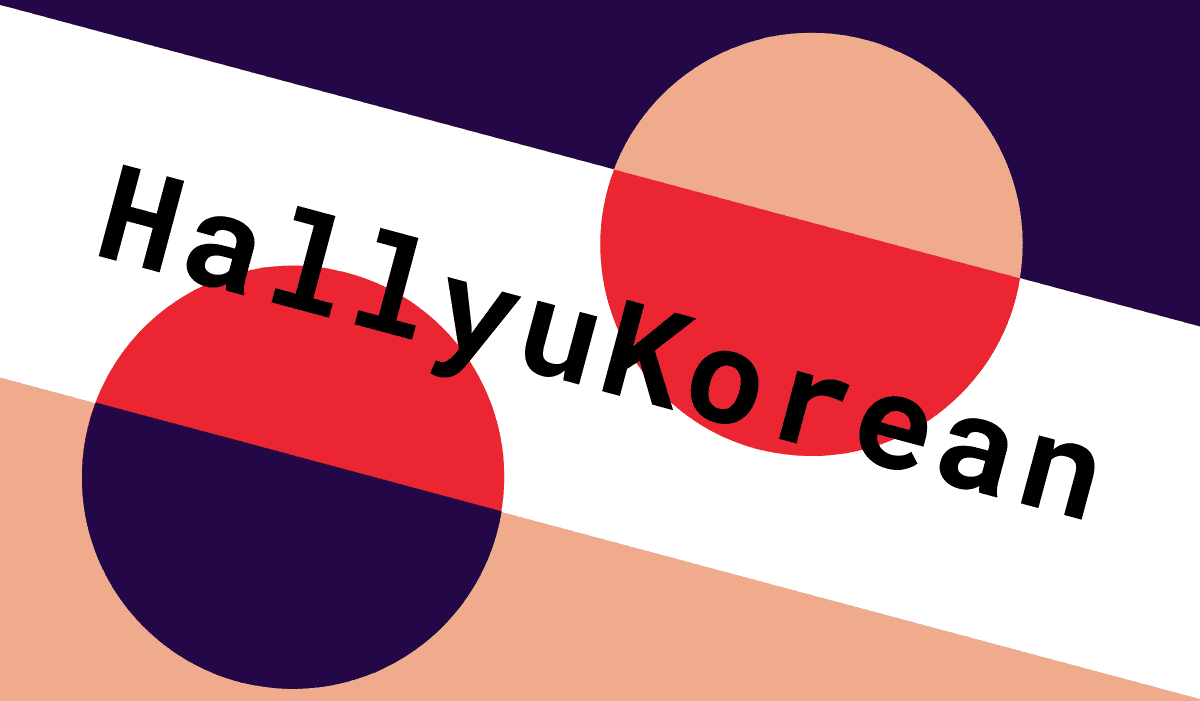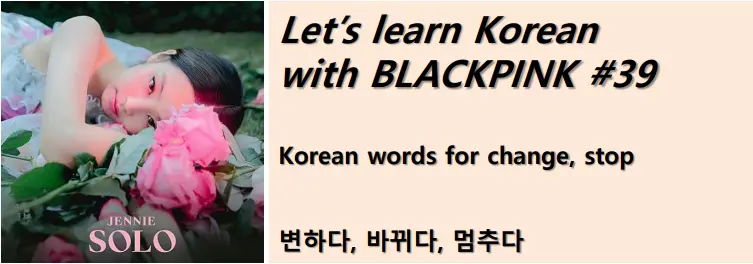Korean words for change, stop : 변하다, 바뀌다, 그대로, 멈추다
Let’s learn Korean words for change, stop with BLACKPINK lyrics.
Click the play button below to listen to all the BLACKPINK lyrics used in this post.
변하다 [byeon-ha-da] to change
사람은 변해
sa-ra-meun byeon-hae
People change
*사람(people) + 은(topic particle) +
변해(change)
바뀌다 [ba-kkwi-da] to change, to be replaced
사계절이 바뀌어도 변하지 않아
sa-gye-jeo-ri ba-kkwi-eo-do byeon-ha-ji a-na
Although the four seasons change, I don’t
*사(four) + 계절(season) + 이(subject particle) +
바뀌어도(바뀌다(be changed) + 아/어도(even if)) +
변하지 않아(변하다(change) + ~지 않다(don’t))
(*바뀌다 is the passive voice of 바꾸다. 바꾸다 is a transitive verb and 바뀌다 is an intransitive verb.
A transitive verb is a type of verb that needs an object to make complete sense of the subject’s action.
An intransitive verb is a verb that does not necessarily need an object to make sense of the subject’s action in a sentence or context.)
그대로 [geu-dae-ro] as it is
내가 걸어가는 이 길을 꿈꾸던 그때 그대로
nae-ga geo-reo-ga-neun i gi-reul kkum-kku-deon geu-ttae geu-dae-ro
Just like when I dreamed of walking on this path
*내가(나(I) + 가(subject particle), =내가) +
걸어가는(걸어가다(walk) + 는(noun modifier)) +
이(this) +
길(path) + 을(object particle) +
꿈꾸던(꿈꾸다(dream) + ~던(noun modifier for past tense)) +
그(that) + 때(time) +
그대로(as it is)
(*Verb stem + ~던 is used to recall a past action or habit that has been repeated often or is still present.
Verb stem + ~았/었던 is used to recall a past event that has not continued into the present.)
멈추다 [meom-chu-da] to stop, to halt
지금 이 시간을 멈춘 채 너와 함께라면 난 I could die in this moment
ji-geum i si-ga-neul meom-chun chae neo-wa ham-kke-ra-myeon nan I could die in thit moment
If I could stop this time and be with you, I could die in this moment
*지금(now) +
이(this) +
시간(time) + 을(object particle) +
멈춘 채(멈추다(stop) + ~ㄴ 채) +
너(you) + 와(with) +
함께(together) + 라면(if) +
난(나(I) + 는(topic particle), =난) +
I could die in this moment
(*~ㄴ/은 채 is used to indicate that the state of the clause it describes continues until the action in the next clause.)
Grammar Reference
*~면, ~으면, ~다면, ~(이)라면 : if (hypothetical)
ex)함께라면 : 함께(together) + ~라면(if)
For more detailed information on ‘~다면/~(이)라면’, please refer to the below YouTube.
*Tense
*Present tense : Adjective/verb stem + ~아/어/해요
*Past tense : Adjective/verb stem + ~았/었/했어요
*Future tense : Adjective/verb stem + ~(으)ㄹ 거예요 / ~ㄹ 게요/ ~겠어요
The basic way to get the verb/adjective stem is to remove 다 from the verb/adjective.
If there is a vowel ㅏ or ㅗ on the final syllable of the adjective/verb stem, 아요(present tense), 았어요(past tense), 을 거예요(future tense) is used.
If there is a vowel other than ㅏ or ㅗ on the final syllable of the adjective/verb, 어요(present tense), 었어요(past tense), ㄹ 거예요(future tense) is used.
Also, if there is 하다 in the adjective/verb, 하다 changes to 해요(present tense), 했어요(past tense), 할 거예요(future tense).
Below you can see the conjugation of 변하다, 바뀌다, 멈추다 by tenses.
| Present tense | Past tense | Future tense | |
| 변하다 | 변해요 | 변했어요 | 변할 거예요 |
| 바뀌다 | 바뀌어요 | 바뀌었어요 | 바뀔 거예요 |
| 멈추다 | 멈춰요 | 멈췄어요 | 멈출 거예요 |
*Speech levels
The three most commonly used Korean speech levels are 합쇼체 (formal polite), 해요체 (informal polite) and 해체 (informal plain).
*The formal polite style : Adjective/verb stem + ~(스)ㅂ니다
~(스)ㅂ니다 is used more in formal or public situations including the military, news, reporting presentations, meetings and lectures. It’s mainly used to address large gatherings or people you don’t know personally.
*The informal polite style : Adjective/verb stem + ~아/어/해요
~아/어/해요 is most commonly used in everyday life. Compared to the formal polite style, the informal polite style is softer and less formal, so it is mainly used among family members, friends, shopkeepers and other close acquaintances.
*The informal plain style : Adjective/verb stem + ~아/어/해
As for the informal plain style ~아/어/해, it is mainly used among friends from superiors to people of lower rank and among family members.
Below you can see the conjugation of 변하다, 바뀌다, 멈추다 by speech levels.
| Formal polite | Informal polite | Informal plain | |
| 변하다 | 변합니다 | 변해요 | 변해 |
| 바뀌다 | 바뀝니다 | 바뀌어요 | 바뀌어 |
| 멈추다 | 멈춥니다 | 멈춰요 | 멈춰 |

